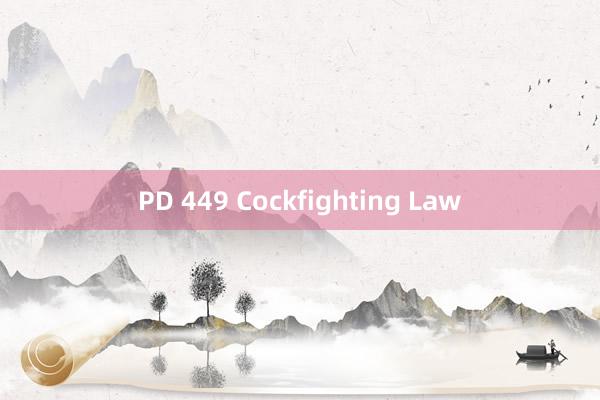PD 449 Cockfighting Law

PD 449 Cockfighting Law: Understanding Its Implications and Significance
Cockfighting, a blood sport that pits roosters against one another in often brutal and deadly combat, has deep cultural roots in many parts of the world. However, it is also a practice that has drawn widespread criticism due to the cruelty inflicted upon the animals involved. Over the years, governments around the world have passed legislation to either regulate or outright ban the sport. One such law is PD 449, also known as the Cockfighting Law, which plays a significant role in managing cockfighting activities in the Philippines.
What is PD 449?
Presidential Decree 449, commonly referred to as the Cockfighting Law, was signed into effect by President Ferdinand Marcos in the Philippines in 1974. The law was designed to regulate cockfighting within the country, reflecting a balance between cultural tradition and public welfare. Although cockfighting is a popular pastime in many rural areas of the Philippines, there was a growing need to curb illegal activities surrounding the sport, such as unsanctioned betting, animal cruelty, and unsupervised cockfighting events.
PD 449 provides a legal framework for how cockfighting can be conducted, where it can take place, and under what circumstances. The decree covers the licensing and operation of cockpits (venues where cockfighting is held), the conduct of derbies, and other key aspects of the sport. The law attempts to address the concerns of animal rights advocates while still respecting local traditions.
Key Provisions of PD 449
PD 449 contains several key provisions designed to regulate cockfighting while ensuring that it remains within the boundaries of the law. These provisions include:
-
Licensing of Cockpits and Operators: Cockfighting can only take place in licensed venues known as cockpits. These cockpits must comply with specific regulations, including obtaining a license from the local government. Moreover,phim sex việt nam địt nhau cực mạnh cockpit operators are required to maintain certain standards to ensure the safety of participants and spectators.
-
Legal Days for Cockfighting: According to PD 449, xxx viet nam hd cockfighting is only allowed on specific days. These include Sundays, xxxx thai lan legal holidays, and during local fiestas or celebrations. This provision ensures that cockfighting does not interfere with regular working days and restricts the frequency of such events.
-
Supervision and Regulation of Derbies: A derby refers to a tournament-style cockfighting event in which multiple matches are held. PD 449 specifies that such derbies must be organized under the supervision of licensed promoters and must adhere to strict guidelines. Betting is only allowed in licensed derbies, ensuring that the sport is conducted in a controlled and regulated environment.
go888king -
Animal Welfare: While PD 449 does not explicitly ban cockfighting, it emphasizes the need for humane treatment of animals. Roosters used in cockfighting must be well cared for, and there are guidelines in place to prevent excessive cruelty. While this may seem contradictory to the nature of the sport, it reflects the law's attempt to minimize unnecessary suffering.
The Cultural Significance of Cockfighting
Cockfighting has been a part of Filipino culture for centuries, deeply ingrained in local customs and traditions. In many rural areas, it is not just a sport but also a social gathering where people come together to celebrate, place bets, and enjoy the excitement of competition. The sport's historical and cultural importance is one of the reasons why it remains legal under strict regulations in the Philippines.
For many Filipinos, cockfighting is a tradition passed down through generations. It is common to see roosters being raised and trained specifically for these events, often with significant financial investment. Cockfighting derbies can draw large crowds, and the sport is seen as a way to bring communities together during local fiestas and holidays.
Controversies Surrounding Cockfighting
Despite its cultural significance, cockfighting is not without controversy. Animal rights activists have long argued that the sport is inherently cruel, as the roosters are often equipped with sharp blades or spikes attached to their legs, making the fights bloody and often fatal. Critics also point out that cockfighting fosters illegal gambling, especially in unsanctioned events, which can lead to other criminal activities.
Additionally, there is concern that PD 449, while attempting to regulate the sport, does not do enough to address the ethical implications of cockfighting. Many believe that the law should be revisited, with stricter provisions aimed at protecting the animals involved or even an outright ban on the sport.
The Future of Cockfighting in the Philippines
As society progresses, there is growing pressure to rethink the legal status of cockfighting in the Philippines. The country has made significant strides in animal welfare in recent years, with many calling for stronger laws to protect animals from cruelty. While PD 449 remains in effect, there is an ongoing debate about whether it should be amended or replaced with more comprehensive legislation.
Advocates for the sport argue that cockfighting is a part of Filipino heritage and should be preserved. They believe that the existing regulations are sufficient to ensure the sport is conducted responsibly. However, opponents insist that no amount of regulation can justify the inherent cruelty involved in cockfighting, calling for a complete ban on the practice.
Conclusion
PD 449, or the Cockfighting Law, is a reflection of the complex balance between tradition and modern values. While it provides a legal framework for the sport of cockfighting, it also raises questions about animal rights and ethical considerations. As the debate continues, the future of cockfighting in the Philippines remains uncertain. What is clear, however, is that any changes to the law will need to carefully weigh the cultural significance of the sport against the evolving standards of animal welfare in the country.
VVJL onlinewww.melgacense.com






